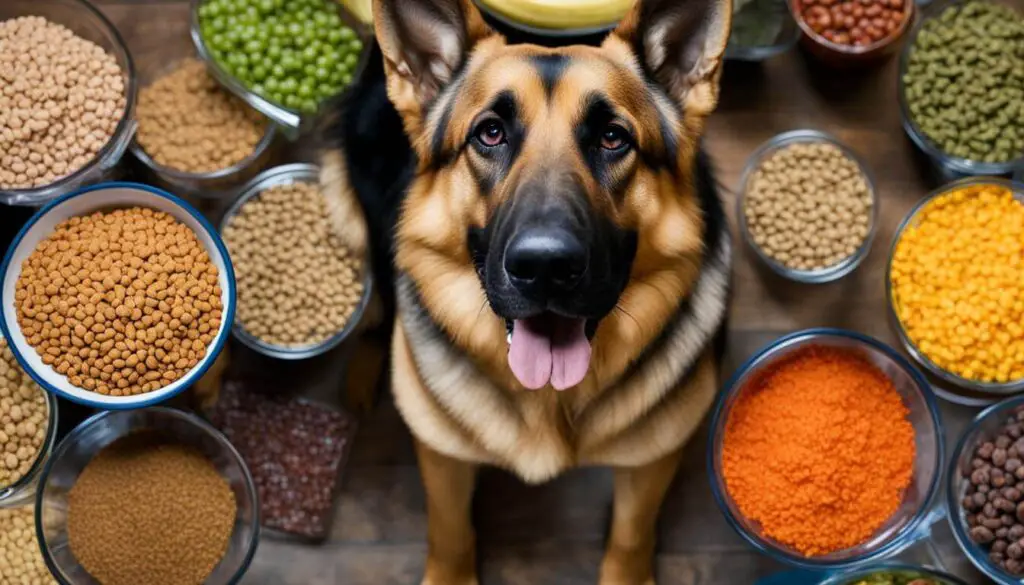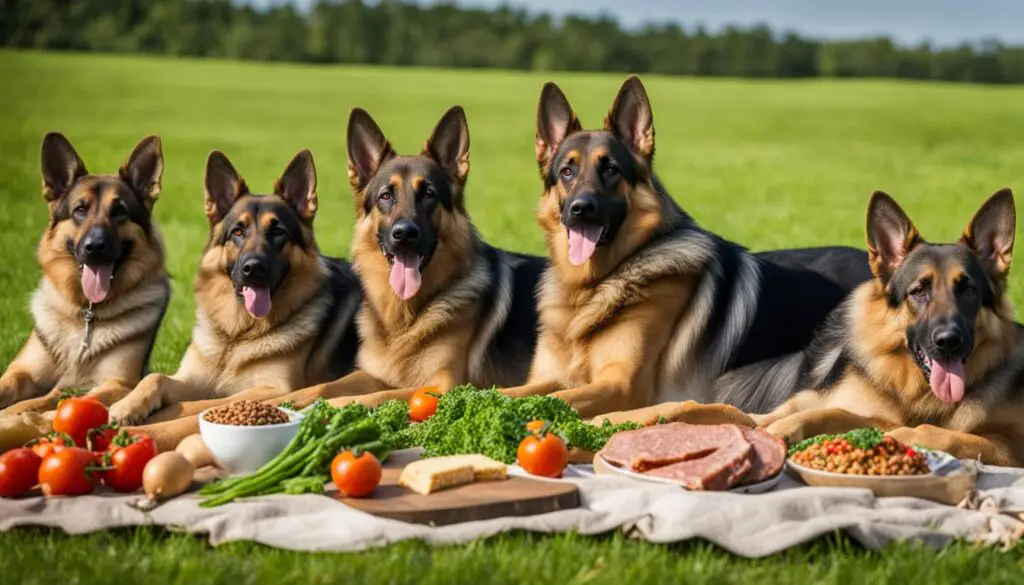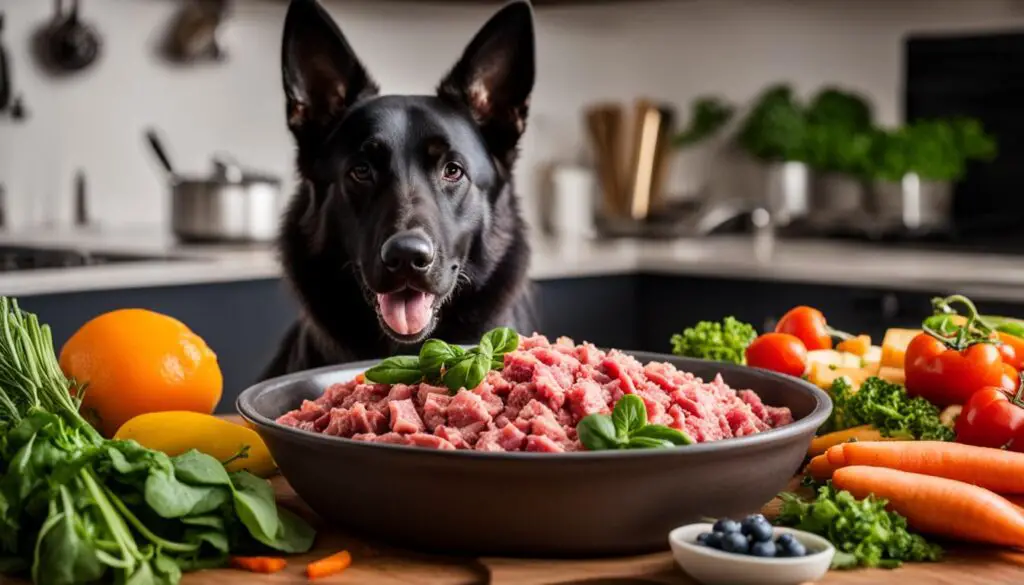As a dog owner, you want what’s best for your furry friend. When it comes to food, you may be wondering what the best options are for your German Shepherd. In this post, we will go over some tips on what food is best for German Shepherds in terms of nutrition and diet.
First of all, it’s important to know that all dogs are different and therefore have different dietary needs. Just like humans, each dog has a unique metabolism and will require different amounts of food based on their activity level, age, and overall health. That being said, there are some general guidelines that can be followed when it comes to feeding your German Shepherd.
Generally speaking, German Shepherds need a diet that is high in protein and fat. This is because they are a working breed of dog and need the energy to stay active throughout the day. The best way to ensure that your German Shepherd is getting enough protein and fat is to feed them a quality dry kibble that is specifically designed for working dogs. There are many great brands out there that offer high-quality food and Joint Supplements for German Shepherds.
In addition to a high-protein diet, German Shepherds also need plenty of exercise. This breed is known for being active and playful, so it’s important to make sure they are getting enough exercise every day. A good way to tire out your German Shepherd is to take them for long walks or runs, or even better, let them run off-leash in an open area where they can really stretch their legs.
If you follow these tips on what food is best for German Shepherds, you can rest assured knowing that you are doing everything you can to keep your furry friend happy and healthy.
Key Takeaways:
- German Shepherds have unique dietary needs that should be taken into consideration.
- Choosing a high-quality diet is crucial for their overall health and well-being.
- Factors such as age, activity level, and health concerns should be considered when selecting their food.
- There are various options available, including raw food, commercially prepared fresh food, homemade diets, and kibble-based options.
- Consulting with breeders and veterinarians can help you make the best food selection decisions for your German Shepherd.
Benefits of a Healthy Diet Plan for German Shepherds
There are numerous benefits to feeding your German Shepherd a healthy diet plan. Perhaps the most obvious benefit is that a healthy diet can help your German Shepherd maintain a healthy weight. Keeping your German Shepherd at a healthy weight is important for many reasons. For one, it helps reduce the risk of obesity-related health problems, such as joint problems, heart disease, and diabetes. Additionally, a healthy weight can help your German Shepherd live a longer, healthier life.
A healthy diet can also help to boost your German Shepherd’s immune system. A strong immune system is important for keeping your dog healthy and preventing illnesses. Additionally, a strong immune system can help to reduce the severity and duration of illnesses if your German Shepherd does happen to fall ill.
feeding your German Shepherd a healthy diet can also help to improve your dog’s energy level and overall mood. A healthy diet provides the nutrients that your German Shepherd needs to feel energetic and happy. If you’ve noticed that your dog seems sluggish or depressed, a change in diet may be all that’s needed to help your dog feel better.
As you can see, there are many benefits to feeding your German Shepherd a healthy diet plan. A healthy diet can help your dog maintain a healthy weight, improve his coat and skin health, boost his immune system, and improve his energy level and overall mood. If you’re looking for ways to help your German Shepherd stay healthy and happy, a healthy diet is a great place to start.
Understanding Dog Food Selection for German Shepherds
When it comes to choosing the right food for your German Shepherd, it’s important to consider their unique dietary needs. With so many options available, it can be overwhelming to make the best decision for your furry friend. Raw foods, commercially prepared fresh foods, homemade diets, and kibble-based options are all viable choices for German Shepherds. However, it’s important to note that a vegetarian diet is not recommended for long-term feeding.
Before making a decision, it’s crucial to do your research, consult with breeders and veterinarians, and take into account factors such as your dog’s allergies, lifestyle, and budget. Each dog has specific needs, so there is no one-size-fits-all approach to dog food selection for German Shepherds. By considering these factors, you can make an informed choice that meets your dog’s nutritional requirements.

Factors to Consider
When selecting dog food for your German Shepherd, there are several key factors to consider:
- Age: Puppies, adult dogs, and senior dogs have different nutritional needs. Choose a food that is appropriate for your dog’s age.
- Activity Level: Active dogs require more calories and protein to support their energy levels. Consider your dog’s activity level when selecting their food.
- Health Concerns: If your German Shepherd has any specific health concerns, such as allergies or digestive issues, choose a food that addresses those issues.
- Lifestyle: Take into account your dog’s lifestyle and feeding preferences. Some dogs thrive on kibble-based diets, while others may do better on raw or homemade foods.
- Budget: Consider your budget when selecting dog food. While cost shouldn’t be the only factor, it’s important to choose a food that you can afford long-term.
By keeping these factors in mind and making a well-informed decision, you can ensure that your German Shepherd receives a balanced diet that meets their unique nutritional needs.
Simplifying the Food Selection Process for German Shepherds
When it comes to selecting the best food for your German Shepherd, the process can seem overwhelming. With so many options available, how do you know which one is right for your furry friend? By simplifying the food selection process and prioritizing key factors, you can make an informed decision that meets your German Shepherd’s nutritional needs.
Factors to Consider
Start by making a list of your priorities and important considerations. Think about whether you prefer kibble or canned food, whether you’re open to raw food options, and whether you want to go with a homemade or commercially prepared diet. Consider your dog’s age, any allergies or health issues they may have, their lifestyle, your available preparation time, and your budget.
Consulting with Professionals
It’s important to consult with breeders and veterinarians to get their expert advice on food selection for German Shepherds. They can help steer you in the right direction based on your dog’s specific needs and provide valuable insights. Additionally, doing thorough research and reading reviews can also help you make an informed decision.
Making the Switch
If you decide to transition your German Shepherd to a new type of food, it’s important to do so gradually. Sudden changes in diet can upset their stomach and cause digestive issues. Start by mixing a small amount of the new food with their current food and gradually increase the proportion of the new food over time. This will give their digestive system time to adjust to the change.
Remember, every dog is different, and what works for one German Shepherd may not work for another. It may take some trial and error to find the perfect food for your furry companion, but by simplifying the food selection process and prioritizing key factors, you can make a well-informed decision that promotes their health and happiness.
| Factors to Consider | Priority |
|---|---|
| Kibble or Canned | High |
| Raw Food | Medium |
| Homemade or Commercially Prepared | High |
| Grain or Grain-Free | Medium |
| Dog’s Age | High |
| Allergies or Health Issues | High |
| Lifestyle | Medium |
| Preparation Time | Medium |
| Cost | Medium |
The Importance of Breed-Specific Nutrition for German Shepherds
German Shepherds have specific nutritional requirements that are essential for their optimum health. Due to their genetics and working dog nature, these intelligent and active dogs require a high-quality diet to maintain their overall well-being, strength, and endurance. It is crucial to understand their unique dietary needs and provide them with the best possible food.
Making homemade or raw food for German Shepherds requires effort and careful consideration. It is important to research specific recipes or consult with a veterinary nutritionist to ensure that the diet is nutritionally balanced. Homemade food preparation allows for complete control over ingredients and quality, while raw food options provide a more natural, unprocessed diet. However, transitioning from commercial dog food to homemade or raw food should be done gradually to allow the dog’s digestive system to adjust.
In conclusion, breed-specific nutrition is vital for German Shepherds to thrive and maintain their health. By providing them with a high-quality diet that meets their specific nutritional needs, including a base diet of beef, wheat, and leafy greens, owners can ensure their German Shepherds lead long, happy, and healthy lives.

Table: Nutritional Guide for German Shepherds
| Nutrient | Recommended Daily Amount |
|---|---|
| Protein | 22-24% |
| Fat | 10-12% |
| Carbohydrates | 40-50% |
| Fiber | 2-5% |
| Calcium | 1.2-1.8% |
| Phosphorus | 0.8-1.5% |
| Vitamin A | 5,000-10,000 IU |
| Vitamin E | 30-50 IU |
The Effort of Making and Transitioning to Homemade and Raw Food for German Shepherds
Making the switch to homemade or raw food for your German Shepherd requires dedication and careful planning. It involves taking the time to research and follow specific recipes or consulting with a veterinary nutritionist to ensure that your dog’s diet is nutritionally balanced. Homemade food preparation can be time-consuming, but it allows you to have complete control over the ingredients and quality of the food you are feeding your dog.
Transitioning your German Shepherd from commercial dog food to homemade or raw food should be done gradually. Start by mixing a small amount of homemade or raw food with their regular food and gradually increase the proportion over time. This gradual transition gives your dog’s digestive system time to adjust and reduces the chances of digestive upset.
When preparing homemade or raw food for your German Shepherd, it is important to strike a nutritional balance. Include essential nutrients such as vitamins, minerals, and protein sources to ensure that your dog is getting all the necessary nutrients for optimal health. Consult with a veterinary nutritionist to create a balanced meal plan that meets your dog’s specific nutritional needs.
Benefits of Homemade and Raw Food for German Shepherds
Feeding your German Shepherd homemade or raw food offers several benefits. Firstly, you have complete control over the ingredients, allowing you to choose high-quality meats, fruits, and vegetables. This can be especially beneficial if your dog has allergies or sensitivities to certain ingredients commonly found in commercial dog food.
Secondly, homemade and raw food diets are often less processed and contain fewer additives and preservatives. This can contribute to better overall health and well-being for your German Shepherd.
Lastly, many German Shepherd owners report improvements in digestion, energy levels, coat condition, and overall vitality when feeding their dogs homemade or raw food. While it does require more effort and planning, the potential benefits make it a worthwhile endeavor for many dog owners.

| Homemade and Raw Food for German Shepherds | Benefits |
|---|---|
| Control over ingredients | Allows for customization; beneficial for dogs with allergies or sensitivities |
| Less processed food | Contains fewer additives and preservatives |
| Potential health improvements | Better digestion, increased energy levels, improved coat condition |
Final Words
Selecting the best food for your German Shepherds is a crucial responsibility as a dog owner. By understanding their unique nutritional needs and considering factors such as age, health, and lifestyle, you can make informed choices that promote their overall health and well-being. Whether you opt for kibble-based options, homemade meals, or raw food diets, prioritizing high-quality ingredients and a balanced nutrition is essential.
Frequently Asked Questions (FAQs)
What should I consider when selecting dog food for a German Shepherd?
Factors to consider include the dog’s age, activity level, any specific health concerns, allergies, lifestyle, and budget.
What types of dog food are suitable for German Shepherds?
Raw foods, commercially prepared fresh foods, homemade diets, and kibble-based options can all be suitable choices for German Shepherds.
How can I simplify the process of selecting the best food for my German Shepherd?
Make a list of your priorities and important considerations, such as kibble or canned, raw or homemade, and grain or grain-free options. Consider factors such as the dog’s age, allergies, lifestyle, preparation time, and cost.
What are the specific nutritional requirements for German Shepherds?
German Shepherds require a high-quality diet that includes beef, wheat, and leafy greens like cabbage and alfalfa to meet their genetic and working dog nature.
What is the importance of selecting the best food for a German Shepherd?
Selecting the best food for a German Shepherd is essential for their overall health, strength, and endurance. It contributes to their energy, longevity, and well-being.

